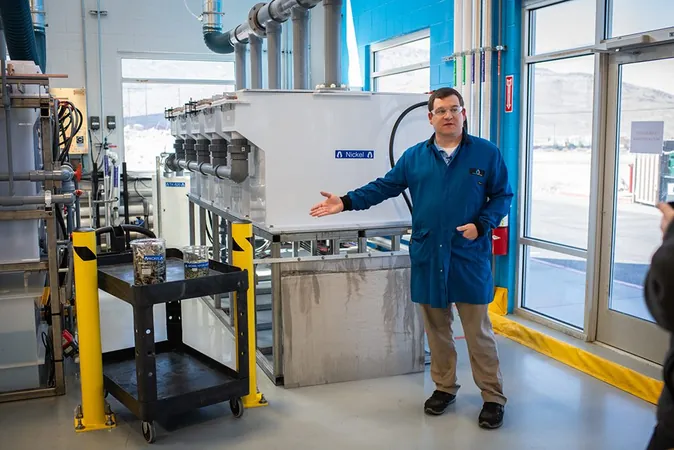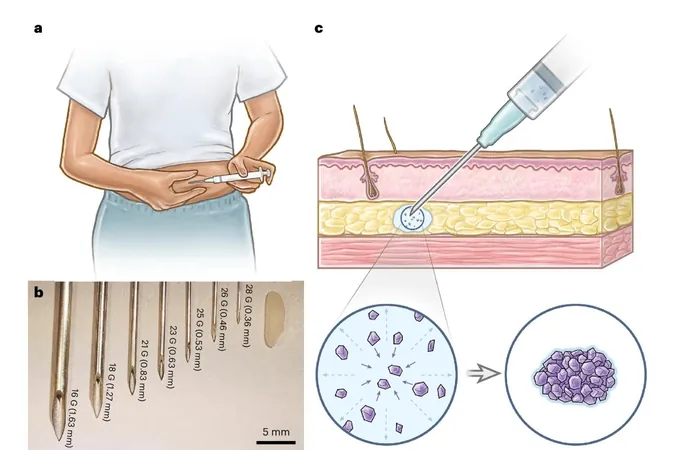
Aqua Metals Revolutionizes Battery Recycling with High-Quality Cathode Active Material
2025-03-26
Author: Daniel
Introduction
In a groundbreaking development for the lithium-ion battery industry, Aqua Metals, a prominent US-based recycling firm, has successfully produced cathode active material (CAM) from recycled nickel sourced entirely within the country. This innovative achievement could pave the way for more sustainable battery production and reduce reliance on overseas sources for critical materials.
Innovative Recycling Process
Utilizing its proprietary AquaRefining process, Aqua Metals recovered high-purity nickel from spent lithium-ion batteries and manufacturing scrap. The company has transformed this recycled nickel into battery-grade nickel nitrate, which is a key component in the production of CAM. A manufacturing partner then applied a low-carbon process that minimizes waste, successfully converting the nickel nitrate into battery-grade CAM without generating sodium sulfate—a byproduct typically associated with such processes.
Assessment by Major Manufacturers
A major Tier 1 lithium battery manufacturer is currently assessing this newly manufactured CAM. Early test results indicate that it meets the rigorous chemical and electrochemical specifications required for compatibility with the manufacturer's existing production processes. This compatibility is crucial for battery manufacturers looking to integrate sustainable materials into their supply chains.
Statements from Leadership
Steve Cotton, President and CEO of Aqua Metals, expressed his enthusiasm about this significant milestone. He stated, 'This milestone confirms that Aqua Metals’ technology enables the reclamation and reuse of critical minerals entirely within the United States, supporting both energy security and the clean energy economy. We have demonstrated that a circular supply chain for battery materials is commercially viable today.'
Impact on the Industry
This development not only highlights the importance of recycling in the growing electric vehicle sector but also underscores the urgent need for sustainable practices in battery production. As the demand for lithium-ion batteries continues to soar due to the rapid adoption of electric vehicles and renewable energy storage solutions, innovations like those from Aqua Metals are crucial in ensuring the sustainable future of energy storage systems.
Conclusion
With this achievement, Aqua Metals is setting a new standard in the industry, positioning itself as a leader in the circular economy of battery materials and contributing significantly toward a cleaner, greener future. The implications of successful practices like this could resonate throughout the entire automotive and energy sectors, potentially revolutionizing how batteries are sourced and produced.





 Brasil (PT)
Brasil (PT)
 Canada (EN)
Canada (EN)
 Chile (ES)
Chile (ES)
 Česko (CS)
Česko (CS)
 대한민국 (KO)
대한민국 (KO)
 España (ES)
España (ES)
 France (FR)
France (FR)
 Hong Kong (EN)
Hong Kong (EN)
 Italia (IT)
Italia (IT)
 日本 (JA)
日本 (JA)
 Magyarország (HU)
Magyarország (HU)
 Norge (NO)
Norge (NO)
 Polska (PL)
Polska (PL)
 Schweiz (DE)
Schweiz (DE)
 Singapore (EN)
Singapore (EN)
 Sverige (SV)
Sverige (SV)
 Suomi (FI)
Suomi (FI)
 Türkiye (TR)
Türkiye (TR)
 الإمارات العربية المتحدة (AR)
الإمارات العربية المتحدة (AR)